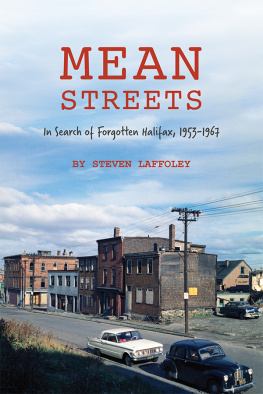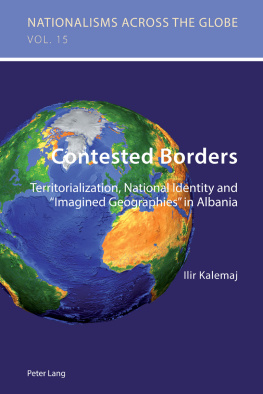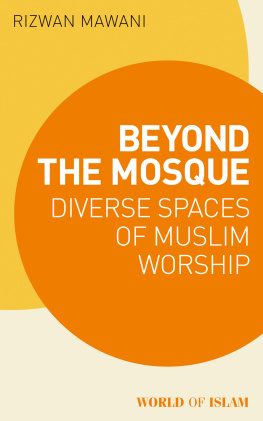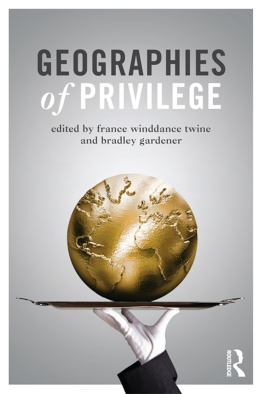In Their Place
Radical Geography
Series Editors:
Kate Derickson, Danny Dorling
and Jenny Pickerill
Also available:
Space Invaders
Radical Geographies of Protest
Paul Routledge
In Their Place
The Imagined Geographies of Poverty
Stephen Crossley
First published 2017 by Pluto Press
345 Archway Road, London N6 5AA
www.plutobooks.com
Copyright Stephen Crossley 2017
The right of Stephen Crossley to be identified as the author of this work has been asserted by him in accordance with the Copyright, Designs and Patents Act 1988.
British Library Cataloguing in Publication Data
A catalogue record for this book is available from the British Library
ISBN 978 0 7453 3683 1 Hardback
ISBN 978 0 7453 3679 4 Paperback
ISBN 978 1 7868 0119 7 PDF eBook
ISBN 978 1 7868 0121 0 Kindle eBook
ISBN 978 1 7868 0120 3 EPUB eBook
This book is printed on paper suitable for recycling and made from fully managed and sustained forest sources. Logging, pulping and manufacturing processes are expected to conform to the environmental standards of the country of origin.
Typeset by Stanford DTP Services, Northampton, England
Simultaneously printed in the United Kingdom and United States of America
Contents
For Harriet, Daisy and Sam.
I hope I make you proud.
Acknowledgements
The idea of a sole-authored book is, in this instance at least, a misnomer. Whilst the majority of the words that follow are mine, the ideas on which they are based, and the work on which they hopefully build, are not. Although relatively few people have been directly involved in helping me write this book, many more have been supportive of me in my wider writing endeavours and in helping me think through and develop some of the ideas contained within these pages. There are too many of these people to mention individually here but, hopefully, you know who you are. If in doubt, ask me next time you see me.
My PhD supervisors Roger Smith and Lena Dominelli have given me the confidence, freedom and time to write this book when really I should have been concentrating on my thesis. Thank you. Jenny Thatcher and her colleagues of the British Sociological Association Bourdieu Study Group kindly invited me to give a paper at an event they held in November 2014, which encouraged me to explore the through the front door rhetoric associated with the Troubled Families Programme, discussed in . Dan Silvers photographic reminders about the symbolic power of abandoned shopping trolleys reassured me that this issue was a thing.
In tracing the events that led to me submitting a proposal for the Radical Geography series, I must thank Jane, John, Adrian, John again, Tom, Ted, Linda, Ted again, and Danny. The views of the three anonymous reviewers were very helpful in shaping the final manuscript. New colleagues at Northumbria University have helped protect me from the potential ravages of entering employment as a university lecturer in the current period. Special thanks go to Lucy, Claire, Marion, Justine, Sean, Alison and John, who have been very supportive and protective of me, helping me to find time to write, although Im not sure many were aware of just what I was doing when I kept telling them I was busy.
Danny Dorling, surely a contender for nicest man in academia, has been incredibly supportive and approachable since the day I first met him. Being told by him that he thought we shared the same prejudices remains a career highlight. His comments on drafts of the chapters have undoubtedly added to the book. Maggie Walker and Ian Menter also helped to make sure the final version was a lot more incisive than my first attempts. David Castle at Pluto has been consistently supportive and helpful, and patient. And Nedas e-mails always made me smile, so thank you as well.
Special mention must go to Tom Slater and Gerry Mooney, whose critical interrogations of place and space, and the ways in which spaces can be deployed and used against marginalised groups, have been so useful to me. I returned to them many times when I was struggling with my writing. But more than that, they have both been very consistent supporters of me, and my other scholarly efforts. I would like them to know that their messages and offers of support mean a lot to me.
Finally, Mam, Dad and Jo, thank you for everything.
Series Preface
The Radical Geography series consists of accessible books which use geographical perspectives to understand issues of social and political concern. These short books include critiques of existing government policies and alternatives to staid ways of thinking about our societies. They feature stories of radical social and political activism, guides to achieving change, and arguments about why we need to think differently on many contemporary issues if we are to live better together on this planet.
A geographical perspective involves seeing the connections within and between places, as well as considering the role of space and scale to develop a new and better understanding of current problems. Written largely by academic geographers, books in the series deliberately target issues of political, environmental and social concern. The series showcases clear explications of geographical approaches to social problems, and it has a particular interest in action currently being undertaken to achieve positive change that is radical, achievable, real and relevant.
The target audience ranges from undergraduates to experienced scholars, as well as from activists to conventional policy-makers, but these books are also for people interested in the world who do not already have a radical outlook and who want to be engaged and informed by a short, well written and thought-provoking book.
Kate Derickson, Danny Dorling and Jenny Pickerill
Series Editors
1
Introduction
The Spaces of Others
The idea of difference is at the basis of the very notion of space, that is, a set of distinct and coexisting positions which are exterior to one another and which are defined in relation to one another through relations of proximity, vicinity, or distance, as well as through order relations, such as above, below, or between.
Pierre Bourdieu, 1996.
THE OTHERS
Space has been called the fundamental stuff of geography, There is, then, general agreement that the concept of space as a dead, fixed and immobile place is no longer relevant. Massey stated in For Space that it may therefore be productive to think about space differently. This book attempts to think differently about the spaces associated with people living in poverty. There is, however, no grand narrative, or meta-theory being advanced here. Instead, the intention is to draw attention to the ways in which various groups of people, such as politicians, academics, policymakers, journalists and social reformers use spaces in different ways, doing so, more or less explicitly, to support and augment their arguments and perspectives on poverty.
Other issues such as poor parenting, drug addiction, a less than enthusiastic approach to work, sexual promiscuity and poor financial management have also been advanced as causes or drivers of poverty on a fairly regular basis. These insinuations are examples of how people experiencing poverty are Othered by the rest of society, or those who do not experience such hardship. In this way, the alleged behaviour of the poor help to establish them as a distinct group, a separate social entity different and inferior to the non-poor. Othering has been described as:






